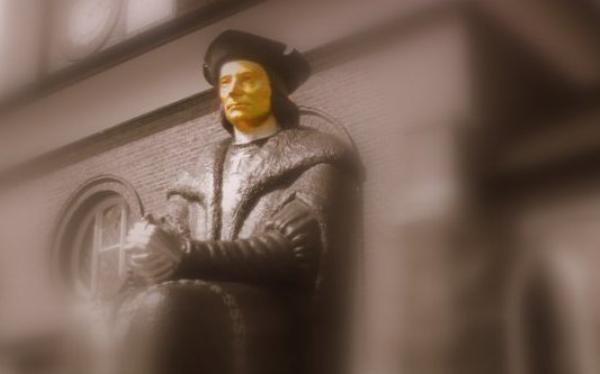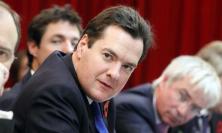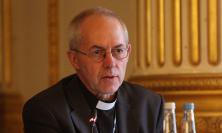The House of Commons will elect a new Speaker on Monday 22nd June, the Feast Day of St Thomas More, the patron saint of statesmen. In his Pentecost Homily, Cardinal Keith O’Brien called on MPs to recover high standards and exercise virtue, quoting Pope John Paul II on St Thomas: ‘His life teaches us that Government is above all an exercise of virtue.’ Joe Egerton looks at what is at stake.
The central role of the House of Commons
In 1399, the Lords and Commons of England assembled before an empty throne and the Bishop of St Asaph declaimed the Articles of Deposition of Richard II. In 1595, the English Jesuit Robert Parsons[1] published The Conference on the Succession,[2] in which he offered an account of the English constitution, a book described as ‘arguably the best political work written by an Englishman between Thomas More’s Utopia and Hobbes’ Leviathan.’ [3]
Parsons argued, citing 1399 as one of a number of precedents, that the English nation (‘the commonwealth’) retained the right to replace a government that threatened to damage it. In asserting that the nation had what we now call ‘a right of recall’, Parsons was introducing a new and important idea into political thinking,[4] one that has shaped subsequent English and British history.
Since the eighteenth century, replacing the government has not been a matter of changing the monarch. The power of changing the government now rests with the House of Commons. Prime Ministers who lose their Commons majority at a general election usually resign at once, although there is precedent for facing Parliament if the result is close[5]; and we should note that backbench MPs have forced Prime Ministers out midterm[6] – something that cannot happen in the United States, for instance. It is the power of the Commons – acting on behalf of the nation as a whole – to be able to force out a Prime Minister that makes our system a constitutional regime: without the power to remove the incumbent of Number 10 Downing Street our system would be a dictatorship.[7] The Commons is the mediator between the electorate and the government – even governments enjoying large majorities in the Commons have only been supported by a minority of the popular vote.
A good deal, therefore, depends on the constitutional credibility of the House of Commons. It is to the Commons as an institution that we have to look for protection against incompetence and malevolence.
A fall from grace
Recent election results, opinion polls, the continuing growl of discontent on programmes such as Question Time and repeated comments on doorsteps, all show that the expenses scandal has done immense damage to the credibility of the present House of Commons. The danger, of course, is that long-term damage will be done to the institution and particularly to the next House.
Cardinal Keith O’Brien captured the public mood better, I think, than anyone else when he said:
Many other people have been equally shattered at what we might call the ‘fall from grace’ of many called to serve in politics and public life, with money at the root of many difficulties. Just a few years ago I was preaching in the church of St Mary’s Undercroft in the Houses of Parliament at Westminster – indicating to those gathered there that ‘we share a vocation founded on the desire to be of use to others and to serve the common good’. I quoted words from the late Pope John Paul II in the great Jubilee Year of 2000 when he declared that St Thomas More was the patron saint of politicians and stated: ‘His life teaches us that Government is above all an exercise of virtue’.
On behalf of very many suffering and bewildered people, I call on those in public service of whatever kind who have failed us to reclaim the high standards which we expect of them and to give the example required of them to all in our country, however difficult it might be to implement this.[8]
The reclamation of high standards cannot be achieved overnight. Worryingly, polling data shows a growing public exasperation and impatience. The Guardian/ICM poll in late May [9] showed a strong demand for an election in the autumn, but not immediately: two thirds wanted an election this year, but only one third an immediate election. This fits what I heard from the voters during the recent elections: ‘they’re all as bad as one another’, ‘they’re all at it’ – but this is superficial. If asked ‘Do you think Ann Widdecombe can be trusted?’ the answer was, ‘Yes’. So also with Kate Hoey, Chris Huhne, and many others. Ask, in most constituencies, for an example of something the local MP has done that is actually wrong and none is offered. There is, rather, clear and general anger at MPs who have ‘taken too much prosperity’[10]. An autumn poll would allow voters to reflect on the character of their sitting MP as well as to look at the alternative candidates. The mood is now shifting towards an immediate election, which would allow less time for reflection. The latest Sunday Times/YouGov poll[11] showed a strong demand for an immediate election – 49% wanting an immediate election, 24% in the autumn.
The symbolism of the election of a Speaker
The election of a new Speaker on 22nd June is an opportunity for MPs to show that they are working for the reclamation of high standards. But if the House of Commons does not select as its Speaker an MP who can command the trust and confidence of the nation then it will inflict further grave damage on the reputation of the institution. Party games will simply alienate and enrage the electorate.
The substance of the election
The election of the Speaker is not just a matter of image. There are substantial powers at stake. Some commentators suggest that the Speaker is just a chairman of debates, circumscribed by rules and precedents, and with no real power. This is not the case. The Speaker decides who gets to speak and who does not. This is real power. Imagine if a Speaker were only to call those Labour MPs hostile to Gordon Brown at Prime Minister’s questions! A Speaker can also truncate oleaginous backbench flattery and silence a Minister mid-speech. Most important of all, the Speaker selects amendments, and can insist that the House continues to discuss them if he or she believes this necessary to a proper exercise of its legislative function.
The Speaker is not nearly as circumscribed by rules and precedent as some claim. Many rules were made by Speakers – and Speakers can and do change them. In 1975, the Speaker (George Thomas) did exactly that. Since 1880, Speakers had repeatedly refused to allow amendments to make a piece of legislation dependent on the holding of a referendum to be debated. The precedent was absolutely clear. Nobody could try to insert such a provision into a Bill. However, Mr Speaker Thomas upheld a ruling by the Chairman of a Committee of the House that such an amendment could be moved to the Scotland and Wales Bill, unprecedently making an Act of Parliament dependent on a plebiscite, in this case in just two parts of the United Kingdom. And there are many areas where the Speaker has discretion. A Speaker could also gravely embarrass a Minister – even the Prime Minister – were he or she publicly to rebuke that individual.
The front benches try to bully Speakers. Mr Speaker Thomas was often under great pressure during the Callaghan minority government, and similarly Mr Speaker Weatherill was put under pressure at difficult moments for Mrs Thatcher. Governments bully Speakers because they know that Speakers can make their lives very difficult indeed. Speakers do have power.
A difficult voting system
The House of Commons will face two disadvantages on 22st June. First, this election is going to be by secret ballot. Of course secrecy is unlikely to be maintained long – well-informed lists of who voted for whom will doubtless circulate within hours. And it will be a brave MP who refuses to answer a direct question of ‘who did you vote for?’ if it is put to him or her at a constituency meeting.
Second, the process will be one of elimination. It is a great deal less sensible than that of a Conclave electing a new Pope, where nobody is elected until two thirds of the Conclave agrees to him. Certainly Pope John Paul II would not have been elected under the process for electing a Speaker, and probably neither would John XXIII; great Popes have been elected because earlier front-runners were unacceptable to a third of the College of Cardinals. The system of elimination to be used on 22nd June carries a high risk that the candidates who come through to the last round have strong factional support but do not command the support of the House as a whole. The Commons starts at a disadvantage, and that makes conscientious and careful action by each and every MP all the more important.
A danger – and an opportunity
There are reports in the press that a number of MPs intend to vote for party or partisan advantage. However, this House of Commons has severely tried the temper of the electorate. G K Chesterton once observed that it is shocking how few politicians are hanged. This of course is only really true of the Anglo-Saxon democracies. [12]
Of course no MP will be hanged over the expenses affair or their conduct on 22nd June. But the new Speaker will be weighed by the electorate – and the House may be found wanting. If MPs do not visibly act conscientiously and carefully, some may soon consider that death would have been merciful compared to protracted media torture, or indeed the painful and persistent interrogation by political opponents and potentially their own supporters. One suspects that few local parties will hesitate to de-select any MP whose folly and imprudence is going to hand the constituency over to another party.
The judicial murders of St Thomas More and St John Fisher (22nd June is a joint celebration) are a powerful reminder of how unpleasant absolutist government is. The House of Commons is the main guarantee in our system of constitutional government and it can only function properly with a Speaker who commands public support if he or she has to stand up to the government. We have recently had one case of an MP – Damian Green – being arrested and threatened by police officers with life imprisonment after he used information given to him by a Home Office official to oppose the activities of Ministers. If the institution becomes completely discredited, then the future is dark. Democracy, as Churchill observed, is the worst form of government until one looks at the alternatives.
But this is to look on the black side. The election of the new Speaker is an opportunity to demonstrate by a prudent and conscientious approach that the present House of Commons is striving to recover the trust that has been lost. There are some suggestions by St Thomas Aquinas and St Ignatius of Loyola that might help. St Thomas Aquinas emphasises the importance of intention. In the context of the election of the Speaker, this means asking ‘who will do the best job to restore the Commons to its proper place in our national life?’ and supporting at each stage the person best fitted. Other considerations must be pushed to one side. St Ignatius of Loyola suggests that, if faced with a difficult choice, one should imagine oneself on one’s deathbed (where no earthly gain can matter) and then make the choice. [13] Above all, there is the example of St Thomas More, who went to his death because he refused to swear an oath which he regarded as incompatible with the law of God. Perhaps Mr Speaker Martin’s last act has redeemed his period of office – by choosing the date of his leaving office so that Members of Parliament elect his successor on a day when they are reminded by St Thomas More of the virtues to which they are called.
Joe Egerton has worked in financial regulation since 1985 and ran a course on Aristotle with a little help from Aquinas for the Mount Street Jesuit Centre.
[1] Parsons was a former Fellow of Balliol College, Oxford, who had been converted by William Good and St Edmund Campion’s superior on the Mission to England. He founded the English College at St Omers, now Stonyhurst College and wrote A Christian Directory, described by Evelyn Waugh as ‘a book of sturdy Christian piety’. He also wrote controversial political works.
[2] The Conference on the Succession. A copy is available on the Europeana website at http://www.europeana.eu/portal/full-doc.html?
query=robert+parsons&tab=&start=1&startPage=1&uri=http://www.europeana.eu/resolve/record/
03504/397993DF3950602FDF9A08B9D3350E3AA82440E7&view=table&pageId=bd
[3] Peter Holmes, Renaissance and Compromise: The Political Thought of Elizabethan Catholic (Cambridge 1982) p. 135. Leviathan is in many respects an absolutist reply to Parsons’ argument for constitutional government; and later authors influenced by Parsons include Disraeli.
[4] Parsons’ great Jesuit contemporary Francisco Suarez offered a similar account of the nature of civil society, but excluded the right of recall. Luther was a defender of the right of princes.
[5] In 1923, the Conservatives were the largest party but lacked an overall majority; Baldwin faced Parliament and only resigned when the Liberals joined Labour in a vote on the King’s Speech. In February 1974, Edward Heath tried to reach an agreement with the Liberals to remain in power.
[6] Neville Chamberlain resigned on 10 May 1940 after his majority fell to 81 at the end of the Norway debate on 8 May 1940 – on 9 May the chief whip told him he would lose a vote of confidence. In 1990, Margaret Thatcher failed to secure re-election as leader of the Conservative Party in a poll of Conservative MPs; she resigned after her cabinet colleagues told her she would be defeated in a second round. The departure of Tony Blair was preceded by strong displays of Parliamentary discontent.
[7] Note that the power is one to force out – the power to select a leader of all three main parties is shared between MPs and party supporters. Before 1965, Conservative MPs did not choose the leader of the party. In both 1956 and 1963, the choice (Macmillan and Home) was probably not the one Conservative MPs would have made.
[8] Homily preached by Cardinal Keith Patrick O’Brien, Mass for Pentecost Sunday, St Mary’s Cathedral, Edinburgh, Sunday 31st May 2009; see also Homily for Easter Sunday preached by Cardinal Keith Patrick O’Brien, Sunday 12th April 2009.
[10] The definition of injustice in Aristotle’s Nicomachean Ethics: EN V.1, 1129a4 -1130a14; see also St Thomas Aquinas: Commentary on the Nicomachean Ethics, Book V, Lecture 1 and Summa IIaIIae Q59 Art 1.
[12]The list of European politicians to have been put in front of firing squads since 1918 includes one French prime minister (Laval) and one Greek premier (Venizelos) as well as the Italian Foreign Minister Ciano. English politics have not been totally without violence. During the last century, both Lloyd George and Alec Home had to be rescued after foolishly trying the temper of the great city of Birmingham. On 18th December 1901 Lloyd George – a leading critic of the Boer War - attempted to speak in the Town Hall after unwisely implying that the Chamberlains had a financial interest in imperialism (‘whenever the Empire expands, the Chamberlains contract’); an angry mob of Joe’s fellow Brummies – tunelessly bellowing ‘We’ll chuck Lloyd George in the fountain and he won’t come to Brum any more’ – first smashed every window in the Town Hall and then battered in the doors. Lloyd George hid in an unlit room, dressed in police uniform and was hidden in a phalanx of tall police officers as infuriated Brummies rampaged through the building. Some days later an MP asked Chamberlain what was wrong with the Brummies –“I would have expected them to kill him” – to receive the response “What is the business of everybody is the business of nobody”. The City did not pay for the repairs to the Town Hall – the cost fell to the Liberal Association that had invited Lloyd George. Alec Home had a lucky escape in Birmingham in the 1964 election – verbal disruption escalated into an attempt to stone the Prime Minister.
[13] EXX 186. One of the methods of making a good election – significantly the last section of the Second Week’s exercises which have an overall heading of ‘Towards Reforming One’s Own Life’; the exercises on making an election follow those for being humble.






